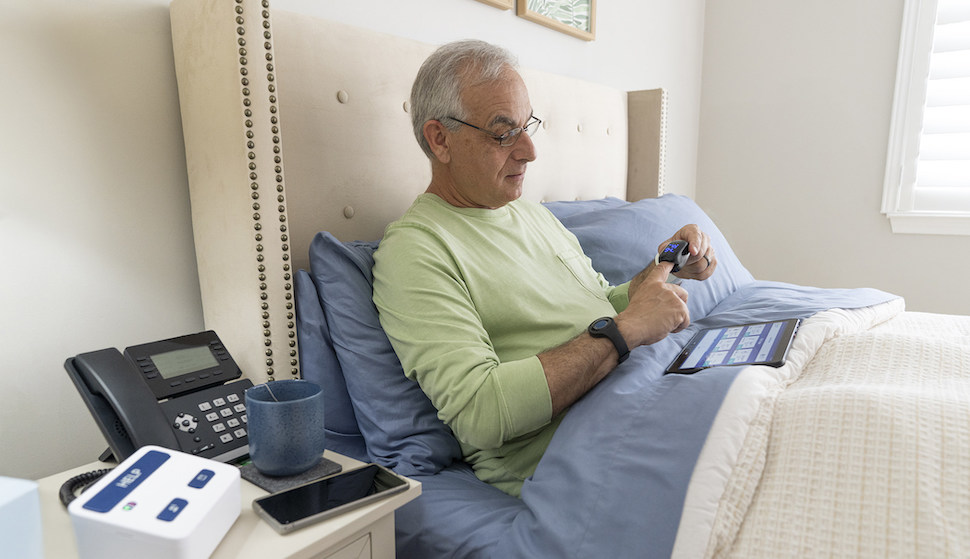Providing acute care at home is a model that’s gained popularity abroad but has been slow to unfold in the U.S.—reportedly because of challenges with reimbursement and other factors. Now a North Texas healthcare company is taking up the challenge.
Arlington-based Texas Health Resources is introducing Texas Health Care at Home, an innovative new model that brings acute-level care directly into patients’ homes. The company says that by expanding its virtual care offerings, it can meet patients’ demands and respond to changing consumer preferences and offer increasingly personalized care.
“Texas Health is embracing innovation and meeting consumers where and when they need us,” Barclay Berdan, FACHE, CEO of Texas Health Resources, said in a statement. “Texas Health Care at Home is the latest example of how we are working to improve the care and well-being of all of our patients, on their terms. As advancements in technology transform the healthcare industry, we’re evolving to care for North Texans today and in the future.”
Launching initially with two hospitals in Fort Worth
The program is launching initially with ER patients at Texas Health Harris Methodist Hospital Fort Worth and Texas Health Harris Methodist Hospital Southwest Fort Worth, and will expand to more hospitals and eligible patients over time, the company said.
The service is available for patients with diseases such as heart failure, COPD, asthma, pneumonia, cellulitis/soft tissue infections, complicated urinary tract infections, gastroenteritis/dehydration and COVID-19, Texas Health added.
Leveraging home health tech plus social and emotional healing
The healthcare company said that Texas Health Care at Home is being launched as its system leverages technology that delivers care to patients in their homes—a familiar place where patients feel more secure, and where they can be surrounded by loved ones while receiving constant monitoring from a medical command center supplemented by in-person healthcare services.
The home setting addresses the social and emotional components of healing and helps reduce readmissions into emergency departments, Texas Health says. Nationally, patients who have received treatment in similar home delivery formats point to major advantages that promote healing—comfort, convenience, and companionship.
How it works
Through continuous patient monitoring working in unison with hands-on care, the patient’s home becomes part of a virtual hub that provides 24/7 care from a medical command center. Texas Health Care at Home will equip homes with the technology needed to connect patients with healthcare professionals while also supplying needed in-person services.
Texas Health says the new option is being launched as it integrates advanced technology amid changing consumer demands, as well as responding to COVID-19’s impact on the healthcare industry. Also, Texas Health says it builds on the system’s technical infrastructure, allowing it to position itself for future medical industry trends.
‘Adapting to new models of care’
“We are partnering with consumers to provide a lifetime of health and well-being, and that means thinking beyond traditional healthcare models,” Kathi Cox, ambulatory and virtual channel COO for Texas Health. “We’re adapting to new models of care to support patients wherever they are.”
The Texas Health Care at Home command center is staffed by physicians, advanced practice providers, nurses, and service coordinators. These healthcare professionals will visit with and assess the needs of patients virtually numerous times a day and will deliver hands-on treatments during in-person visits. In-home visits are based on patient needs that address certain focus areas—for example, administration of IV antibiotics or wound care.
Format developed by Johns Hopkins, Bloomberg School of Public Health
This type of healthcare delivery format was developed by Johns Hopkins University’s School of Medicine and Bloomberg School of Public Health and is gaining popularity across the nation. John Hopkins states that the service has been found to reduce hospital readmissions while helping lower healthcare costs.
Medicare gave approach the green light
The idea has caught the eye of the federal government, too.
Advisoryboard.com reported that in 2020, the Center for Medicare and Medicaid Services gave hospitals the flexibility to care for Medicare patients in their homes with the Acute Hospital Care at Home program. The website reported that by June 2022, more than 242 hospitals across 107 health systems in 36 states were approved by CMS to provide hospital services in a home setting.
Texas Health Resources is a faith-based, nonprofit health system that says it cares for more patients in North Texas than any other provider. Its service area comprises 16 counties and more than 7 million people. It coordinates care through its Texas Health Physicians Group and 29 hospital locations under the banners of Texas Health Presbyterian, Texas Health Arlington Memorial, Texas Health Harris Methodist and Texas Health Huguley.
The system has more than 4,100 licensed hospital beds, 6,400 physicians with active staff privileges, and more than 26,000 employees.
![]()
Get on the list.
Dallas Innovates, every day.
Sign up to keep your eye on what’s new and next in Dallas-Fort Worth, every day.





































































